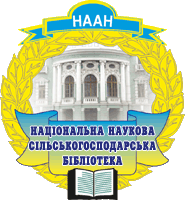 |
Electronic scientific professional edition |
| All numbers / 2018 No.1 / Article No.16 | ||||||
| 16 | B.K. Yenken (1873-1943): formation of personality and scientific worldview | full article | ||||
|
https://doi.org/
|
Pages: | 245-255 |  |
 |
||
| Summary | ||||||
|
The information about life and activity of B.K. Yenken who was an outstanding breeder, teacher, organizer of public agronomy and domestic agricultural research, was first published in 2014 by Academician-Secretary of NAAS V.A. Vergunov. Also biographical information was published in the works of Professor G.L. Zelensky, in the book of memoirs of the academician of RASGN A.V. Pukhalsky who was the former graduate of the Maslovskiy Technical School for Cultivars and Seed Production named after K.A. Timiryazev, V.M. Samorodov – Associate Professor of the Department of Ecology, Environmental Protection and Sustainable Use of Nature of the Poltava State Agrarian Academy. More complete information on the life and scientific path of the scientist is kept in the funds of the Central State Archive of the Supreme Authorities (Central State Archives of Ukraine) as well as in the State Archives of the Kharkiv region (DAKHO, Kharkiv). Boris Karlovich Yenken was born on January 21 (12), 1873 in the city of Tambov (now – the Russian Federation) in the family of a lawyer (sworn advocate) Karl Avgustovych Yenken who had the status of a personal honorary citizen. According to G.L. Zelensky, father of B.K. Yenken graduated from the Faculty of Law of the Imperial Novorossiysk University (now the Odessa National University named after I.I. Mechnikov) in 1875. The mother – Olga Fedorovna was engaged in photography and directed her own photo studio which was placed on the territory of a family home. The family had one more son – Theodore born in 1875. In the autobiography written March 3, 1925, B.K. Yenken noted that «... the family lived on the funds earned by the father, the general living conditions in the family were quite satisfactory». In Tambov, Boris Karlovich graduated from the 7 classes of a real college. Since 1893, for six years he studied at the Agricultural Department of the Riga Polytechnic university (RPU) where he obtained his professional agricultural education. One can not but recall the outstanding RPU scientists who performed organizational, educational and scientific work. These are: Wilhelm Ostwald, Swante Arrhenius, August Tepler, Carl Bischof, Pierce Bill, Paul Waldo and many others. Studying and getting acquainted with the scientists of the university played a huge role in shaping the scientific and educational outlook of a young specialist for the needs of social agronomy. In the years of studying, B.K. Yenken was influenced by the ideas of Professor G.G. Toms (1843–1902) who becomes at that time one of the most prominent specialists in agrochemistry in the country. G.G. Thoms conducted expeditions on the survey of the Baltic region: soil expeditions in Livonia (1885–1887, 1889) and Courland (1893–1894, 1895). According to their results, collections of soil types of the region were collected and described and transferred to the Institute’s Museum. On the basis of the Riga Polytechnic university, a chemical and agricultural station of the university was established, and G.G. Toms has become its director since 1877. Thanks to him, a new department for systematic control of fertilized tufts was organized at the station which also carried out research on seeds. Over the course of the year, the station has studied more than 1000 varied crop samples. Particular attention was paid to the systematic chemical study of soil fertility. Subsequently, in his report devoted to the 25th anniversary of the Poltava experimental field, B.K. Yenken noted that the beginning of the first stage of the formation of a domestic agricultural research was the station of the Riga Polytechnic. By its periodization, the emergence of a research activities in Russia began in 1866 and lasted for more than 20 years until 1885. The second stage of the formation of a research activity was the Kharkov Agricultural Experimental Station founded in 1908, and the third phase at the time of the report in 1912 was not yet completed. With the creation of the Poltava Experimental Field in 1884, the urgency of these issues was aggravated. For the first time, a multifactorial experiment (20 fertilizer variants on 3 soil cultivations) was conducted on the experimental field in four geographic locations that corresponded to the climatic conditions of the European part of Russia. The obtained results confirmed the need to concentrate in one place theoretical developments, experimental observations and studies on agrochemical and agrophysical properties of soils. It should be noted that this was later the methodological basis for the transfer of breeding to scientific basis and the main direction in the work of the Kharkiv Breeding Station since 1908. In 1900, Boris Yenken graduated from the full course of the Riga Polytechnic university and obtained a diploma and a decoration certificate. Throughout the year, he studies the organization of agricultural research in the Kuban where he later grounded the vine-winery near Anapa. In this position, the young specialist has proven himself to be the future prominent representative of the national public agronomy. At this time, the worldviews of the scientist were influenced by the works of V.G. Bazhayev who was a pupil of Professor O.F. Fortunatov and occupied the position of the first provincial agronomist of the Moscow province. In his work, V.G. Bazhayev develop the so-called «Volokolam crop rotation» with the following alternation of crops: 1) fallow; 2) wintering with sowing clover; 3) clover of the first year of use; 4) clover of the second year of use; 5) spring cereals; 6) fallow; 7) spring cereals. By its perfection, this scheme was implemented by B.K. Yenken in the counties of Saratov province during 1900–1907. In 1902, the scientist reports at an agronomic meeting at the Saratov provincial zemstvo administration about the system of organization of branch research activities in the province. Later this report was published in the collection of proceeding of the meeting. Since 1903, he worked as a county agronomist of the Petrovskaya Zemstvo Council of Saratov Province with an official salary of 100 rubles per month. The scientist is deploying active work on propaganda and dissemination of the newest knowledge in agronomy. In the report at the meeting of the Tambov District Zemstvo Council (1904), B.K. Yenken talks about the transition from cereal farming system to the grassland one. During the years 1904–1905, the agronomist Yenken presented a number of reports and notes on improving the organization of agronomic assistance, namely: 1) «On the agronomical organization»; 2) «On agronomic measures»; 3) «Inspection of agricultural production of the county with the purpose of drafting a plan for the promotion of the Provincial Zemstvo for the well-being of the population»; 4) «Grasses cultivation, sowing of fodder beets and some measures for its distribution this year»; 5) «On materials for small loans». The materials of these reports were published in the newspaper «Tambov’s Hunger». In 1905, at the request of the Governor V.F. Fon der Launic, Boris Karlovich was dismissed from the position of zemsky agronomist of the Tambov District Zemstvo as a person who «compromised himself from political confidence». This happened while studying at the RPU. The student Boris Yenken in 1895, for the storage and distribution of illegal literature, fell under police supervision and temporarily dropped out of an educational institution. Under proposal № 2502 of the Atkara County Zemstvo, Yenken goes to a new place and works as a Zemsky agronomist. During the 1906–1907, B.K. Yenken performs duties of the provincial agronomist of the Saratov District Land Division. Holding this position, the scientist, together with M.A. Dimo, P.A. Kostychev, E.A. Panfilov, actively participates in soil-climatic studies of the region in order to create a Saratov Agricultural Research Station (now – FSBSE «Scientific and Research Institute of Agriculture of the South East»). In addition to the basic duties that the scientist performed persistently and professionally, he wrote scientific papers and notes which were published in the magazines of the Samara province and the urban «Zemsky Newspaper». In 1908, because of the refusal of the governor of Saratov to extend the term of Yenken’s stay as a provincial agronomist, he moved to Anapa where he headed the vine-wineries he established in the 1900. Analyzing the period of B.K. Yenken’s activity in the years 1900–1908, it can be argued that a significant contribution to the development of modern agronomy was made not only in Ukraine but also abroad. The scientist managed to introduce the newest agronomic measures in Petrovsky, Volsky, Tambov, Atkara districts and also throughout the Saratov province. As a talented student of their teachers – O.F. Fortunatov and V.G. Bazhayev hi made a huge contribution to the organization and building of agricultural research, a striking example of which is the participation in the creation of the Saratov Agricultural Experimental Station as well as the Grape and Wine Industry (Anapa, Kuban Region). He provided advice to the population on national agronomy, namely: application of crop rotations, fertilizer systems, technologies of cultivation, technical support. Among 127 scientific works of B.K. Yenken, five papers on modern agronomy fall for this period. The next period of life and scientific work of B.K. Yenken is associated with the participation in the Kharkov Agricultural Society whose member he becomes in June 1908. |
||||||
| Keywords | ||||||
| B.K. Yenken, history, biography, agricultural research, agronomy, breeding | ||||||
| References | ||||||
|
||||||
Title page of Edition
© National Scientific Agricultural Library NAAS, 2018